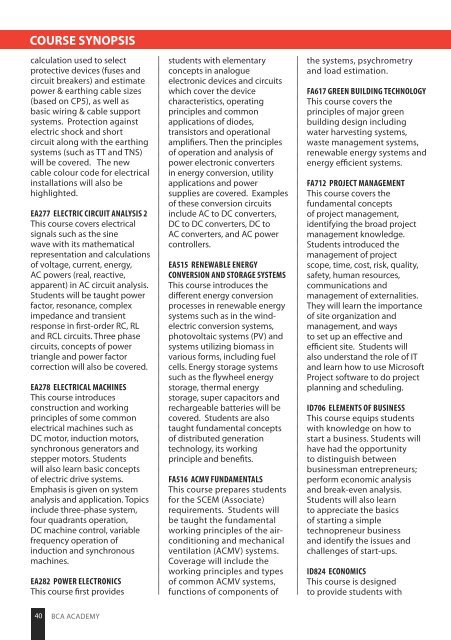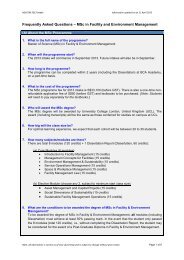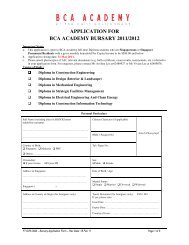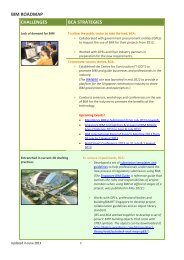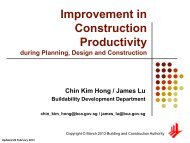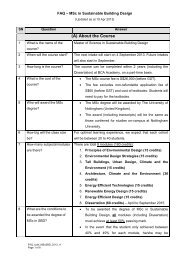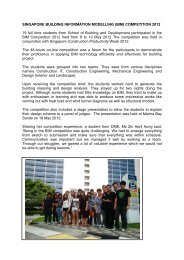DIPLOMA PROGRAMMES - BCA Academy
DIPLOMA PROGRAMMES - BCA Academy
DIPLOMA PROGRAMMES - BCA Academy
Create successful ePaper yourself
Turn your PDF publications into a flip-book with our unique Google optimized e-Paper software.
course synopsis<br />
calculation used to select<br />
protective devices (fuses and<br />
circuit breakers) and estimate<br />
power & earthing cable sizes<br />
(based on CP5), as well as<br />
basic wiring & cable support<br />
systems. Protection against<br />
electric shock and short<br />
circuit along with the earthing<br />
systems (such as TT and TNS)<br />
will be covered. The new<br />
cable colour code for electrical<br />
installations will also be<br />
highlighted.<br />
EA277 ELECTRIC CIRCUIT ANALYSIS 2<br />
This course covers electrical<br />
signals such as the sine<br />
wave with its mathematical<br />
representation and calculations<br />
of voltage, current, energy,<br />
AC powers (real, reactive,<br />
apparent) in AC circuit analysis.<br />
Students will be taught power<br />
factor, resonance, complex<br />
impedance and transient<br />
response in first-order RC, RL<br />
and RCL circuits. Three phase<br />
circuits, concepts of power<br />
triangle and power factor<br />
correction will also be covered.<br />
EA278 ELECTRICAL MACHINES<br />
This course introduces<br />
construction and working<br />
principles of some common<br />
electrical machines such as<br />
DC motor, induction motors,<br />
synchronous generators and<br />
stepper motors. Students<br />
will also learn basic concepts<br />
of electric drive systems.<br />
Emphasis is given on system<br />
analysis and application. Topics<br />
include three-phase system,<br />
four quadrants operation,<br />
DC machine control, variable<br />
frequency operation of<br />
induction and synchronous<br />
machines.<br />
EA282 POWER ELECTRONICS<br />
This course first provides<br />
students with elementary<br />
concepts in analogue<br />
electronic devices and circuits<br />
which cover the device<br />
characteristics, operating<br />
principles and common<br />
applications of diodes,<br />
transistors and operational<br />
amplifiers. Then the principles<br />
of operation and analysis of<br />
power electronic converters<br />
in energy conversion, utility<br />
applications and power<br />
supplies are covered. Examples<br />
of these conversion circuits<br />
include AC to DC converters,<br />
DC to DC converters, DC to<br />
AC converters, and AC power<br />
controllers.<br />
EA515 RENEWABLE ENERGY<br />
CONVERSION AND STORAGE SYSTEMS<br />
This course introduces the<br />
different energy conversion<br />
processes in renewable energy<br />
systems such as in the windelectric<br />
conversion systems,<br />
photovoltaic systems (PV) and<br />
systems utilizing biomass in<br />
various forms, including fuel<br />
cells. Energy storage systems<br />
such as the flywheel energy<br />
storage, thermal energy<br />
storage, super capacitors and<br />
rechargeable batteries will be<br />
covered. Students are also<br />
taught fundamental concepts<br />
of distributed generation<br />
technology, its working<br />
principle and benefits.<br />
FA516 ACMV FUNDAMENTALS<br />
This course prepares students<br />
for the SCEM (Associate)<br />
requirements. Students will<br />
be taught the fundamental<br />
working principles of the airconditioning<br />
and mechanical<br />
ventilation (ACMV) systems.<br />
Coverage will include the<br />
working principles and types<br />
of common ACMV systems,<br />
functions of components of<br />
the systems, psychrometry<br />
and load estimation.<br />
FA617 GREEN BUILDING TECHNOLOGY<br />
This course covers the<br />
principles of major green<br />
building design including<br />
water harvesting systems,<br />
waste management systems,<br />
renewable energy systems and<br />
energy efficient systems.<br />
FA712 PROJECT MANAGEMENT<br />
This course covers the<br />
fundamental concepts<br />
of project management,<br />
identifying the broad project<br />
management knowledge.<br />
Students introduced the<br />
management of project<br />
scope, time, cost, risk, quality,<br />
safety, human resources,<br />
communications and<br />
management of externalities.<br />
They will learn the importance<br />
of site organization and<br />
management, and ways<br />
to set up an effective and<br />
efficient site. Students will<br />
also understand the role of IT<br />
and learn how to use Microsoft<br />
Project software to do project<br />
planning and scheduling.<br />
ID706 ELEMENTS OF BUSINESS<br />
This course equips students<br />
with knowledge on how to<br />
start a business. Students will<br />
have had the opportunity<br />
to distinguish between<br />
businessman entrepreneurs;<br />
perform economic analysis<br />
and break-even analysis.<br />
Students will also learn<br />
to appreciate the basics<br />
of starting a simple<br />
technopreneur business<br />
and identify the issues and<br />
challenges of start-ups.<br />
ID824 ECONOMICS<br />
This course is designed<br />
to provide students with<br />
40 <strong>BCA</strong> <strong>Academy</strong>


